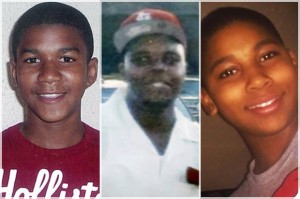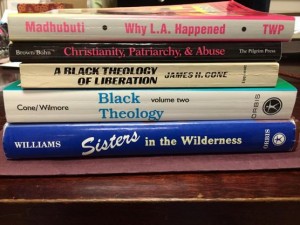 In a piece for Salon last week, Brittney Cooper wrote about her ongoing struggle with rage and frustration in the wake of the Ferguson nonindictment:
In a piece for Salon last week, Brittney Cooper wrote about her ongoing struggle with rage and frustration in the wake of the Ferguson nonindictment:
“I woke up in black skin this morning. Frustrated, because for the first time in a long time, I felt the weight, the scourge of this skin. Had visions of being able to unzip myself, climb out of myself, and lay aside this weight, but the woman who climbed out was darker still. Since black is beautiful, we are never supposed to admit that we are sometimes tempted to believe what white supremacy tells us to believe about ourselves. But you caught me in a moment of weakness.”
It’s a new week, and we have a new nonindictment. This time, the white police officer responsible for what the coroner declared a homicide in the death of Eric Garner won’t be indicted. Watch Spike Lee’s splicing of the video of Garner’s death with the death of Radio Raheem in his 1989 film Do The Right Thing. Then get back to me on how you’re surprised, how this is new, and how you can’t imagine such a thing is possible.
I woke up in white skin this morning. And I realized that no one cared. No one will notice because it’s what I’m supposed to be … it’s what everyone is supposed to be. Anyone who isn’t is systemically punished, shamed, and humiliated. But as long as I wear this invisibility cloak I can get away with all manner of bad behavior.
The hashtag #CrimingWhileWhite emerged on Twitter yesterday, where people talked about underpunished criminal activity in their lives. It provides a litany of micro (and macro) examples of the ongoing double standard between how black people and white people encounter the criminal justice system. From selling drugs to driving under the influence to petty and not-so-petty theft, white people walk around under their invisibility cloaks and the police oblige.
I woke up in my invisibility cloak this morning looking for a spell to make it visible. I think the spell has several components to it.
 First, Educare. Read and listen and learn. Watch films and get a clue. You have no excuse for not knowing what it means to be #AliveWhileBlack. The only excuse is ignorance and willful disregard of human life. To the extent that you are responsible for the education of others, whether it be your children or others children, educate them. Cooper’s Salon piece this week frames this in terms of what we academics call epistemology:
First, Educare. Read and listen and learn. Watch films and get a clue. You have no excuse for not knowing what it means to be #AliveWhileBlack. The only excuse is ignorance and willful disregard of human life. To the extent that you are responsible for the education of others, whether it be your children or others children, educate them. Cooper’s Salon piece this week frames this in terms of what we academics call epistemology:
“That inability to see black people as human, as vulnerable, as children, as people worthy of protecting is an epistemology problem, a framework problem, a problem about how our experiences shape what we are and are not able to know. The limitations of our frameworks are helped along by willful ignorance and withholding of empathy.”
Second, Sprecan. Speak up and speak out when something isn’t right. Call attention to your own invisibility cloak and the ones that others around you are wearing. Call out racism, name privilege, and denounce the injustices that surround you. Talk about the horrible things that white people do under their invisibility cloaks every minute of every day. Talk about the systematic ways that the United States was established to define and protect whiteness. Toward the end of her classic essay on “White Privilege,” Peggy McIntosh makes a challenge that too few people follow-through on:
“[I]f we raise our daily consciousness on the perquisites of being light-skinned. What will we do with such knowledge? As we know from watching men, it is an open question whether we will choose to use unearned advantage to weaken hidden systems of advantage, and whether we will use any of our arbitrarily-awarded power to try to reconstruct power systems on a broader base.”
Which brings me to the third interrelated element of the spell, Actio Justitia. Do something to bring justice into reality. Talking isn’t enough, learning can’t be the end of it. Live differently. Show up at a protest. Assign texts in a class you teach. In a piece for Quartz in August, Janee Woods listed twelve things white people can do, including diversifying the media you consume, be proactive in your local community with workshops and attendance at civic organization’s activities, and don’t be afraid to be unpopular.
She also noted that if you are a person of faith, you can look to your scriptures and holy texts for guidance and inspiration. Additionally, “follow faith leaders that incorporate social justice into their ministry. Ask your clergy person to address antiracism in their sermons and teachings.” Christena Cleveland has written a lovely piece on Advent and Darkness that includes a reminder of what the season means in the Christian story:
“Advent is an invitation to plunge into the deep, dark waters of our worst world, knowing that when we re-surface for air we will encounter the hopeful, hovering Spirit of God. For when we dive into the depths of our worst world, we reach a critical point at which our chocolate and pageants no longer satiate our longing for hope – and we are liberated by this realization. Indeed, the light of true hope is found in the midst of darkness.”
And so, the final element of our spell, Hopa Lumen.
We hope for light. It can motivate us to carry out this spell to cast off these invisibility cloaks.
Educare. The light of education.
Sprecan. The light of truth.
Actio Justitia. The light of collective action.
Hopa Lumen.
Author’s apology: It may be obvious that I’ve been watching a marathon of Harry Potter movies this past week. If only social justice were as easy as getting the right magical spell.












